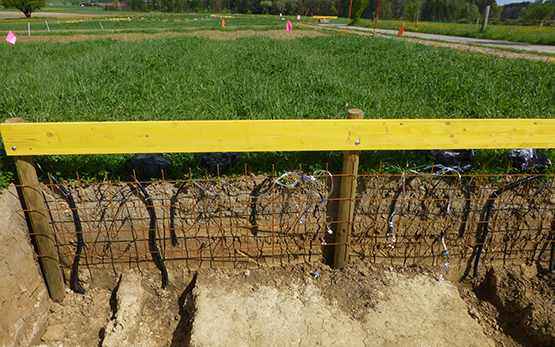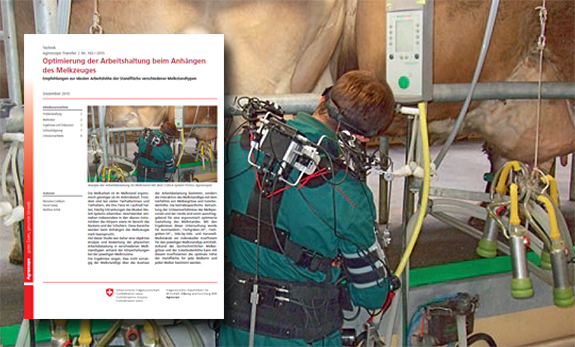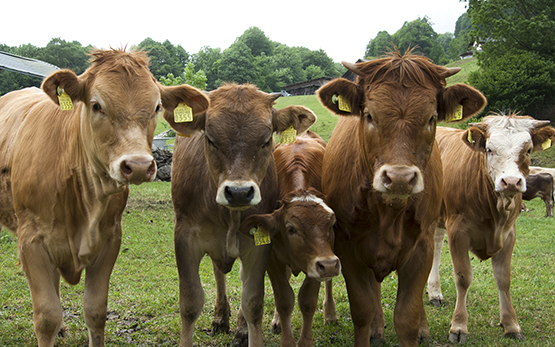Kaiser A.
Transitioning to low-pesticide agriculture: Practices, discourses, and policies.
Hrsg. Universität Basel, 2024, 113 S.
Nelson I., Faxon H., Ehlers M.-H.
Feminist political ecologies of agrarian technologies: Knowing the digital differently.
The Journal of Peasant Studies, In Press, 2024, 1-28.
Kaiser A., Samuel R., Burger P.
Toward a low-pesticide agriculture: bridging practice theory and social-psychological concepts to analyze farmers’ routines.
Sustainability: Science, Practice and Policy, 20, (1), 2024, 1-20.
Krikser T., Ehlers M.-H., Profeta A.
Municipal heat provision experiences and expectations in Germany.
Energy, Sustainability and Society, 14, (4), 2024, 1-12.
Saleh R., El Benni N., Masson S., Ammann J.
Public acceptance and sustainability perceptions of food produced with chemical, digital and mechanical weed control measures.
Food Quality and Preference, In Press, 2023, 1-25.
Saleh R., Ehlers M.-H.
Exploring farmers’ perceptions of social sustainability.
Environment, Development and Sustainability, In Press, 2023, 1-26.
Saleh R.
Soziale Nachhaltigkeit aus Sicht der Landwirtschaft.
Hrsg. Bundesamt für Landwirtschaft BLW, 2023, 3 S.
weitere Sprachen: französisch | italienisch
Mann S.
Angestellte in der Schweizer Landwirtschaft: Lohn und Freundlichkeit gleichermassen entscheidend.
UFA-Revue, 10, 2023, 23-26.
Mann S., Bobeică M., Beciu S., Arghiroiu G. A.
Is there a food waste Kuznet curve?: Some evidence from China, Romania and Switzerland.
Environmental Protection Research, 3, (2), 2023, 230-239.
Mann S.
Fünf Franken für den Liter Milch.
Der Schweizer Bauer, 2023.
Mann S., Arghiroiu G. A.
Sustainable food as a three-dimensional system.
Scientific Paper Series: Management, Economic Engineering in Agriculture and Rural Development, 23, (3), 2023, 491-500.
Heitkämper K.
Arbeitsvoranschlag 2023 und Mechanisierungsstufen in den arbeitswirtschaftlichen Tools von Agroscope.
In: 46. Agrarökonomie-Tagung. 21. November, Hrsg. Agroscope, Tänikon (CH). 2023, 1-19.
Reissig L.
Psychological factors influencing the adoptation of digital technologies in agriculture by farm managers.
In: Conférence ESRS European Society for Rural Sociology. 4 July, Rennes. 2023, 1-14.
Mann S., Loginova D.
Distinguishing inter- and pangenerational food trends.
Agricultural and Food Economics, 11, 2023, 1-18.
Biswas A., Afrad M.S.I., Hoque M. Z., Al Mamun A., Habib M. A., Nayak S., Islam S., Nuruzzaman, Mann S.
Rice variety preferences in Bangladesh: What is the role of public breeders?
Asian Journal of Agricultural Extension, Economics & Sociology, 41, (5), 2023, 152-164.
Reissig L., Cockburn M.
Neuer Rohstoff aus der Landwirtschaft.
Schweizer Bauer, 20. Mai, 2023, 4.
Mann S., Kaiser A.
Why is agricultural policy not more environmentally ambitious? Comparing failed attempts in Switzerland.
Resources, Environment and Sustainability, 11, 2023, 1-7.
Kimmich C., Ehlers M.-H., Kellner E., Oberlack C., Thiel A., Villamayor-Tomas S.
Networks of action situations in social–ecological systems: Current approaches and potential futures.
Sustainability Science, 18, 2023, 1-10.
Mann S.
Postletale Landwirtschaft: Zur anstehenden Reform unseres Agrarsystems.
Springer VS Wiesbaden. 7. Juli, 2022, 126 S.
Glück S., Heitkämper K.
Arbeiten mit digitalen Technologien: Eine Fallstudie am Beispiel von sensor- und kameragesteuertem Hacken im Gemüsebau.
In: 23. Arbeitswissenschaftliches Kolloquium: Arbeit unter einem D-A-CH - Der Landwirt im 4.0-Modus. März, Hrsg. Leibniz-Institut für Agrartechnik und Bioökonomie e.V., D-14469 Potsdam. 2022, 122-131.
Loginova D., Mann S.
Institutional contributions to agricultural producer price stability.
Agricultural and Food Economics, 10, (12), 2022, 1-22.
Ehlers M.-H.
Soziale Nachhaltigkeit aus Sicht der Landwirtinnen und Landwirte.
In: 45. Agrarökonomie-Tagung. 4. Oktober, Hrsg. Agroscope, Tänikon - Agroscope. 2022, 1-14.
Mielewczik M., Heitkämper K., Bozzolini G., Groher T., Umstätter C.
Von manuell bis automatisch - Die Bandbreite des Mechanisierungsgrades am Beispiel der Schweizer Rindviehhaltung.
In: Arbeit unter einem D-A-CH: Der Landwirt im 4.0-Modus. 8./9. März 2022 Potsdam. 23. Arbeitswissenschaftliches Kolloquium.. 8./9. März, Hrsg. Leibniz-Institut für Agrartechnik und Bioökonomie e.V., Redaktion Martina Jakob, 2022, 63-78.
weitere Sprachen: englisch
Umstätter Ch., Mann S., Werner J.
A simple measure for workload as a social sustainability indicator for family farms.
Environmental and Sustainability Indicators, (14), 2022, 1-9.
Mann S.
Why governments should tax animal production: A system approach to internalize the externalities of agriculture.
International Journal of Sustainable Economics, 14, (3), 2022, 294-308.
Hart L., Quendler E., Umstaetter C.
Sociotechnological sustainability in pasture management: Labor input and optimization potential of smart tools to measure herbage mass and quality.
Sustainability, 14, (12), 2022, 1-23.
Sgouridis S., Kimmich C., Solé J., Černý M., Ehlers M.-H., Kerschner C.
Visions before models: The ethos of energy modeling in an era of transition.
Energy Research and Social Science, 88, (June), 2022, 1-15.
Ehlers M.-H., Finger R., El Benni N., Gocht A., Sørensen C. A. G., Gusset M., Pfeifer C., Poppe K., Regan A., Rose D. C., Wolfert S., Huber R.
Scenarios for European agricultural policymaking in the era of digitalisation.
Agricultural Systems, 196, 2022, 1-14.
Ehlers M.-H.
Digitalisierung der Agrarumweltpolitik.
In: 44. Agrarökonomie-Tagung Agroscope. 05. Oktober, Tänikon - Agroscope. 2022.








